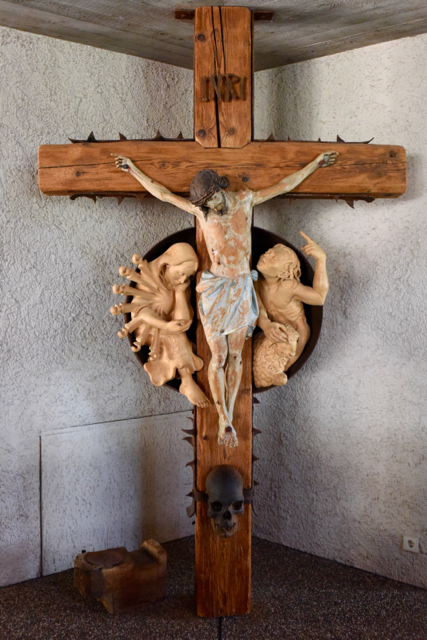My YouYube subscriptions notified me this week that I had a new video from Father Matthew, and Episcopal priest who does humorous and informative vlogs. This week it was The Book of Common Prayer in 4 Minutes. It is a useful and fun romp through the BCP but when he came to baptism he described it as “how we make Christians.” I guess I feel there is still enough Protestantism in the Anglican tradition that this is not a very accurate or helpful description of baptism and is misleading as to how one becomes a Christian. [mfn]He also described the ordination services as “how we make priests” and so on, and while I would quibble with that, I do not find that nearly so theologically problematic. [/mfn] I realize this puts me out of step with my anglo-catholic friends, but I believe it keeps me firmly within our tradition.
I am reminded of when our son was going to be baptized and I discussed this with our rector. He used the same language and yet he also insisted that this was not “how he would be saved.” I was told ‘he becomes a Christian through baptism but is saved through faith.” Hunh? Even if that were theologically correct (which I don’t believe to be the case) it is a best severely confusing for the community/laity. What message are we sending them if we say that baptism “makes you a Christian”? (Oh, but it doesn’t save you.)
As you can imagine, this was a key area of concern and debate leading up to my ordination. In practice I find the BCP and our tradition of baptism and confirmation a tremendous evangelistic tool and an appropriate path for instruction and reception into the community of faith. But we don’t “make Christians.” That is by the spirit and grace of God and the confession and faith of the penitent. [mfn]And now you know why I am no longer (not that I ever really was) a Calvinist.[/mfn]




8 thoughts on “How do you “make a Christian”?”
Being incorporated by baptism into the body of Christ is not as misleading as the term Christian or the term saved. If indeed the Spirit is poured out on all flesh, then baptism is a recognition of prevenient grace and the sealing of that promise that is in God’s promises to all through his Elect via Israel. Saved is then potentially misleading and of course the individual must respond in faith – but who will judge whether that faith is positive or a negative foil to those who think they have the positive sewn up, as it were, in a single word – whether this be orthodox, or Calvinist, or even Christian?
Thanks for the snaps – nice. I will post a collage from yesterday as soon as I find my camera again!
And how intelligent / rational / verbal does confession, penitence and faith have to be? How articulate and explicit and theologically sound? You don’t say how old your son was when he was baptized, or whether you then treated him as a Christian from that point on, able, for example to pray the Lord’s Prayer with you before he may have understood what “our Father” really meant?
Matthew understands baptism to be Jesus’ preferred method for “making disciples” (in conjunction with Christian training). The language of “making Christians” does not seem quite that distant from Matthew’s “making disciples.” How would you distinguish between a Christian and a disciple?
Bob – the use of the term “prevenient grace” indicates a Calvinist view of salvation, one that I clearly don’t share. “Saved” can certainly be misleading and it is reasonable to ask what the term means even the Gospels themselves.
Doug – I don’t quantify or qualify the intelligence or rationality of the confession since the Bible doesn’t. Ultimately confession and repentance are judged by God and certainly not by me. I am a bit confused, however, by your suggestion that one must be a Christian before reciting the Lord’s prayer. As Episcopalians are son was baptized as an infant and theoretically reception of Communion must wait until one is baptized. The recitation of the Lord’s prayer, however, has no such injunctions. As one might guess from my earlier comments, reception of Communion before confirmation does, in fact, make me uncomfortable. But I use it as teaching moments with my own children.
Joseph – You make a good point that I would take even farther. The disciples were adults and so baptism for them was conjoined with a confession, at least in so far as they understood at that time. (As the Gospels make clear, the disciples were the disciples before they really understood who Jesus was.) I guess I would say that being a Christian and a disciple are one and the same and both involve our growth in faith and following Jesus.
Let me make it clear, I do not see baptism/confirmation as a “one and done” deal. That is my point. It is a journey that involves our whole lives and being. When we tell our community that when you are baptized you are “made a Christian” we give the impression that they are done, that they have the stamp on their heavenly passport and they are good to go. Not so. The
Chris – we are not in the same room at the moment. I have never read Calvin so I could not be a Calvinist. I used that term prevenient because we are both Episcopalian (Anglican). Doug has the argument IMO if there is to be one, because faith is not measured by injunction related to the rational or verbal or intelligent. I am sure we have common ground and language in Christ Jesus but I am a bit surprised at your reduction of my sentence to one word. I know a lot of Christians, BTW, in my work and play and worship, who are being made – and sometimes it is a slow process, given the hardness of the heart. I know a lot of non-Christians who are also being made by the same Spirit. My role, to borrow a phrase from Richard Beck’s post today, is to be “faithfully present” to them in Christ in every moment of my life. That is what makes me. Not some doctrine reduced to a word (that neither I nor anyone else could define – since that word is in the case of Calvin attached to a person who was faithfully present to his own time).
Bob, thank you for your reply. I certainly do not mean to be dismissive of your position by reducing your view, or anyone’s, to a single word. The term preveniant grace is most often used in the Calvinist context, I clearly made inappropriate assumptions based on your use of the term. While it is present in such documents as the 39 Articles of Religion, when it comes up in discussions today I find it most often in the sense of what I call the hyper-reformed movement. That is to say, the term is used to mean God’s irresistible grace that draws us to himself, allowing for no free will and assuming a very finite and limited elect. (You can see how your use of the term “the Elect” further caused me to read your statement as being in line with such theology.)
I hope my final paragraphs in my earlier reply makes it clear that we are more in harmony and not, if I may judge by your latest reply. Our growth and development as Christians never ends. I do not think, however, that means that our salvation is in jeopardy. Rather, we must continue to strive to be faithful disciples of Christ.
Chris, let me clarify a little.
My suggestion is a threefold point:
a) Baptism is the sign of the gift of the Spirit which joins us to Christ
b) It is the gift of the Spirit which enables us to relate to God as Father / share the relationship Jesus had with the Father.
c) Logically, as the sign of the Spirit which enables us to know God as Father in Christ, baptism precedes teaching a person to address God as Father.